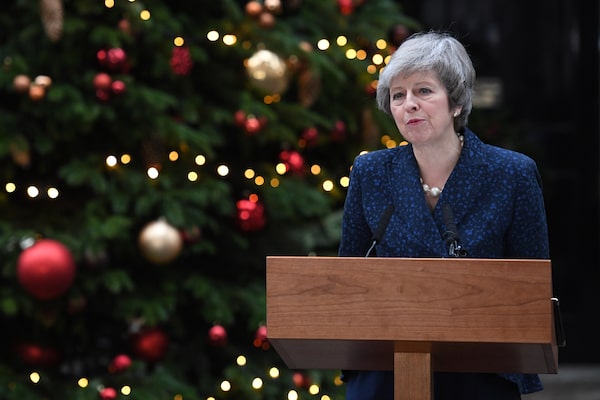
Prime Minister Theresa May makes a statement in Downing Street after it was announced that she will face a vote of no confidence, to take place tonight, on Dec. 12, 2018 in London, England.Leon Neal/Getty Images
British Prime Minister Theresa May is facing a vote of non-confidence in her leadership of the Conservative Party, a move that could see her immediately removed from office.
Conservative members of Parliament will vote on whether to keep her as leader Wednesday evening, and if she doesn’t win a majority she will have to step down as prime minister. She would also be barred from running for re-election in a subsequent leadership race that would last about a month.
The result of the vote is expected to be known shortly after 3 p.m. ET.
The dramatic announcement came Wednesday morning, adding to the growing chaos surrounding Brexit. Ms. May had to pull a parliamentary vote on her Brexit deal with the European Union on Monday because of fierce opposition to the agreement from within her Conservative Party caucus. She has been meeting EU leaders since then in an effort to modify the deal to appease critics, but those efforts will now come to a halt as Ms. May tries to hang on to power.
In a statement outside No. 10 Downing Street, Ms. May vowed to battle, defending her Brexit agreement.
“I will contest that vote with everything I have got,” she said. “A change of leadership in the Conservative Party now will put our country’s future at risk and create uncertainty when we can least afford it.”
She added she is close to reaching a new agreement with the EU and that changing leaders now would jeopardize the process and delay the United Kingdom’s departure from the EU, which is supposed to take place March 29.
“Weeks spent tearing ourselves apart will only create more division, just as we should be standing together to serve our country. None of that would be in the national interest.”
It’s far from certain that Ms. May will lose the vote, and there is no clear favourite to replace her.
Under party rules, only 48 Tory MPs, or 15 per cent of the caucus, were needed to trigger the non-confidence vote. That threshold was met on Tuesday and Ms. May was informed about the tally later that evening after she returned to London from Brussels where she had been meeting EU officials. She wanted the non-confidence vote to be held as quickly as possible.
Ms. May needs 158 MPs to win Wednesday’s vote. If she loses, MPs will select two candidates from among their caucus and party members will decide the winner. Several former cabinet ministers, including Boris Johnson, are expected to be front-runners if there is a leadership contest.
Even some of Ms. May’s harshest critics are expected to support her, arguing a leadership race now would be too disruptive.
“I think the idea of getting rid of the prime minister with all that that would entail, with a leadership contest, would be just hugely irresponsible,” said Tory MP Anna Soubry, who has opposed Ms. May’s Brexit plan.
Several cabinet ministers also lined up to support Ms. May.
“I am backing the Prime Minister 100 per cent – and I urge every Conservative MP to do the same,” Environment Secretary Michael Gove wrote on Twitter. “She is battling hard for our country and no one is better placed to ensure we deliver on the British people’s decision to leave the EU.”
But other MPs welcomed the move, saying it was long overdue given Ms. May’s handling of Brexit.
“The country needs a new leader, it is time for Mrs May to resign,” Tory MP Jacob Rees-Mogg wrote on Twitter.
Tory MP Lee Rowley told the BBC Ms. May’s resilience has become a liability for the country given how badly she has botched the Brexit deal.
"The reality is that stamina isn’t a strategy and it’s not working, and when you’re in a hole you have two choices: you either get out of the hole or you keep digging,” he said. “I’m choosing to get out of the hole and I hope my colleagues are going to do the same today.”
Even if Ms. May wins Wednesday’s vote, her authority has been badly eroded and it’s doubtful she’ll be able to secure a new Brexit deal that would win enough support in Parliament.
EU leaders have also made it clear they won’t renegotiate the agreement, and they will likely view Ms. May as a lame duck.
But if she is removed as leader, a new prime minister could take a much firmer line with the EU, raising the prospect of the U.K. leaving the EU without an agreement. That worries many business leaders who fear the EU could impose tariff and non-tariff barriers on U.K. products once the country is outside the bloc’s single market, which provides for the free movement of people, goods and services.
Business groups reacted with dismay at Wednesday’s developments.
“At one of the most pivotal moments for the U.K. economy in decades, it is unacceptable that Westminster politicians have chosen to focus on themselves, rather than on the needs of the country,” said Adam Marshall, director-general of the British Chambers of Commerce. “History will not be kind to those who prioritize political advantage over people’s livelihoods.”
 Paul Waldie
Paul Waldie